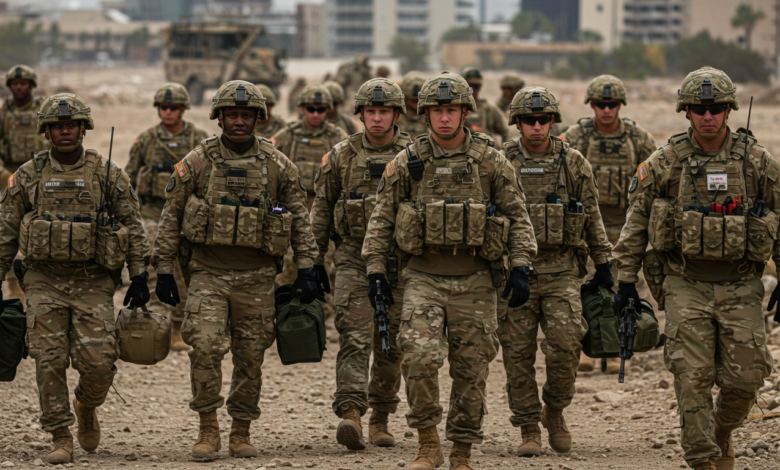Judge Rules Trump’s National Guard Deployment ‘Illegal’

Introduction
In a landmark decision, U.S. District Judge Charles R. Breyer ruled that President Donald Trump’s federalization of the California National Guard and the deployment of U.S. Marines to Los Angeles during the June 2025 protests were illegal. The ruling has significant implications for the balance of power between state and federal authorities, as well as the role of the military in domestic affairs.You know about theglobespot, andaazdaily, openrendz and national guard deployment also Buzzfeed.
Background of the Deployment
In early June 2025, following widespread protests in Los Angeles against federal immigration policies, President Trump issued a memorandum federalizing up to 4,000 California National Guard members and deploying approximately 700 U.S. Marines to the city. The stated purpose was to quell unrest and enforce federal immigration laws. However, California Governor Gavin Newsom strongly opposed the move, asserting that it exceeded presidential authority under Title 10 of the U.S. Code and violated the Tenth Amendment, which reserves powers not delegated to the federal government to the states.
On June 9, 2025, the State of California filed a lawsuit in the Northern District of California, seeking to block the deployment. The lawsuit contended that the executive order violated 10 U.S.C. § 252, the Tenth Amendment, and the Posse Comitatus Act, which restricts the use of the military for domestic law enforcement.
The Court’s Ruling
After a two-hour hearing on June 12, 2025, Judge Breyer issued a 36-page ruling granting California’s request for a temporary restraining order. He found that President Trump’s federalization of the California National Guard was “illegal—both exceeding the scope of his statutory authority and violating the Tenth Amendment to the United States Constitution.” Breyer emphasized that the deployment was not authorized under 10 U.S.C. § 252, which requires consultation with state governors before federalizing the National Guard. Instead, the Trump administration had informed the California National Guard’s adjutant general, bypassing Governor Newsom.
Judge Breyer also expressed concern that the deployment could politicize the military and undermine civilian control. He noted that the military’s involvement in domestic law enforcement could erode public trust and set a dangerous precedent.
Legal Precedents and Implications
The ruling aligns with previous legal precedents that limit the federal government’s authority over state National Guard units. In the 1990 case Perpich v. Department of Defense, the Supreme Court held that Congress could authorize members of the National Guard to be ordered to active federal duty for purposes of training outside the United States without the consent of the state governor. However, this decision did not extend to domestic deployments without state approval.
Legal scholars have long debated the scope of presidential authority under the Insurrection Act and the Posse Comitatus Act. While the Insurrection Act allows the president to deploy troops to suppress insurrections, it requires a declaration of rebellion or invasion. In this case, Judge Breyer found that the protests in Los Angeles did not meet the legal threshold for such a declaration.
The ruling also highlights the importance of state sovereignty and the constitutional principle of federalism. By upholding California’s authority over its National Guard, the court reinforced the idea that states retain significant powers, especially in matters of public safety and law enforcement.
Political Reactions
The decision has sparked a wave of political reactions across the country. Democratic leaders have praised the ruling as a victory for the Constitution and state rights. Senator Tammy Duckworth, a veteran and former National Guard member, expressed alarm at the potential politicization of the military, stating, “The U.S. military and Federal law enforcement deserve better from their Commander-in-Chief.” She emphasized the need to protect the military from being used as a political tool.
On the other hand, Republican officials have criticized the court’s decision, arguing that it undermines the president’s ability to maintain order and enforce federal laws. They contend that the deployment was necessary to address the unrest and ensure public safety.
Ongoing Legal Proceedings
While Judge Breyer’s ruling temporarily halts the deployment, the legal battle is far from over. The federal government has indicated its intention to appeal the decision, and the case may ultimately reach the Supreme Court. Legal experts suggest that the conservative majority on the Court could favor the president’s authority, potentially overturning the lower court’s decision.
In the meantime, the National Guard troops and Marines remain in Los Angeles, pending further legal developments. Governor Newsom has vowed to continue challenging the federalization of the state’s National Guard and to seek the return of control to state authorities.
Conclusion
The ruling by Judge Breyer marks a significant moment in the ongoing debate over the balance of power between state and federal authorities. It underscores the importance of adhering to constitutional principles and legal precedents when determining the scope of presidential authority. As the legal proceedings continue, the outcome will likely have lasting implications for the future use of the military in domestic affairs and the protection of state sovereignty.



